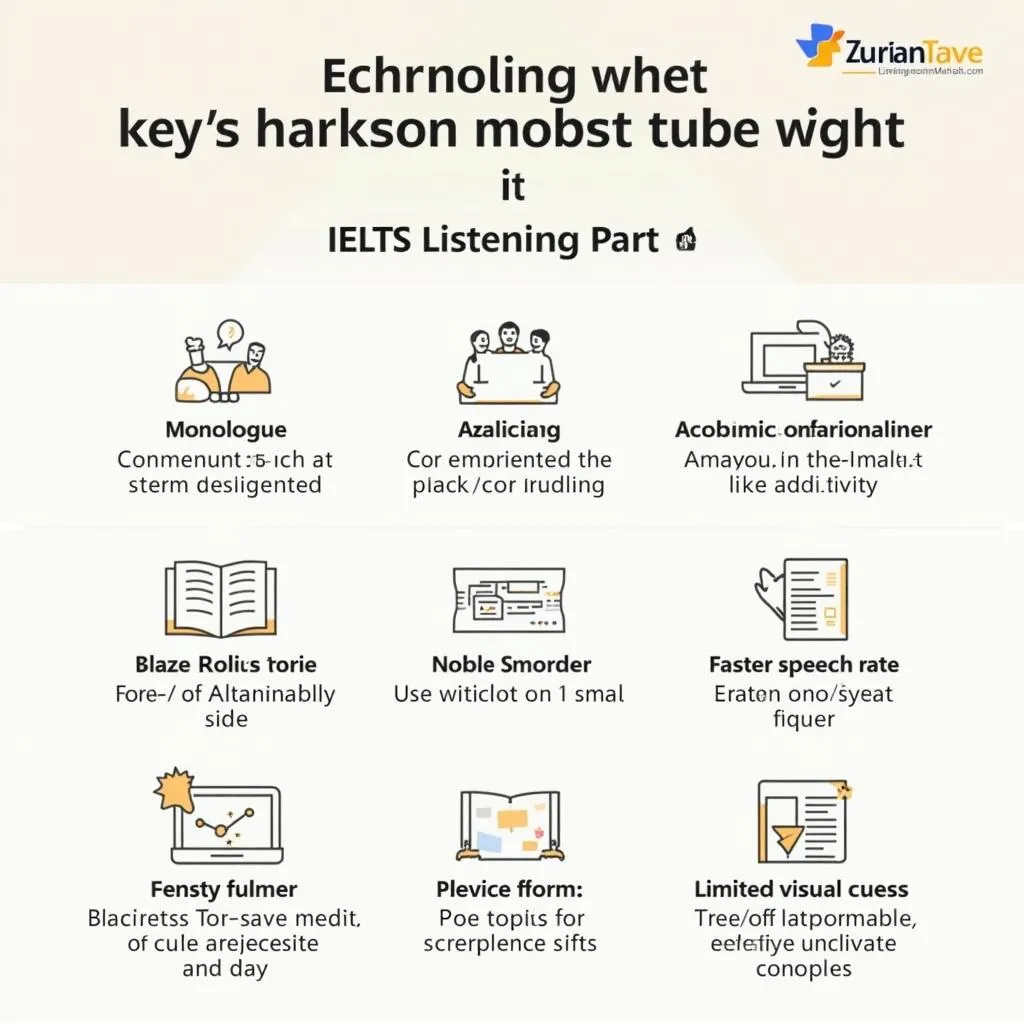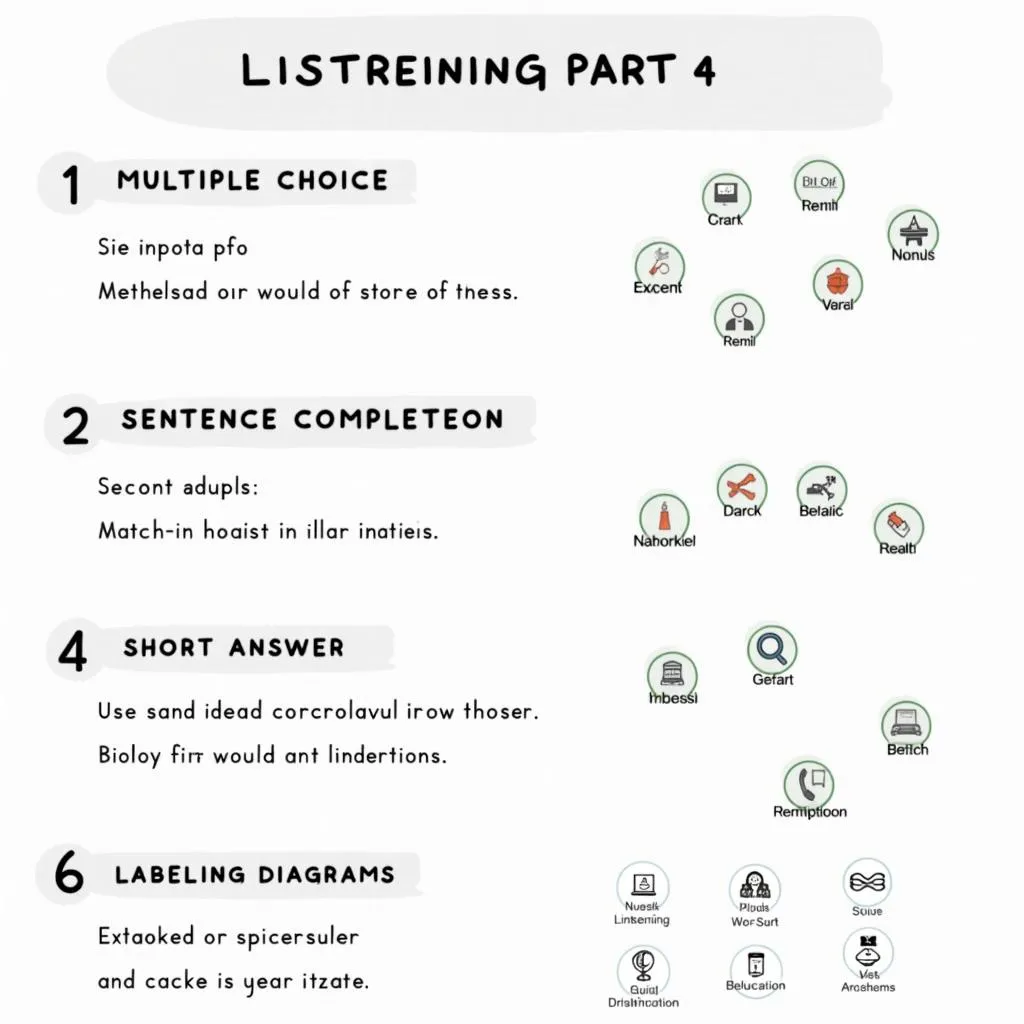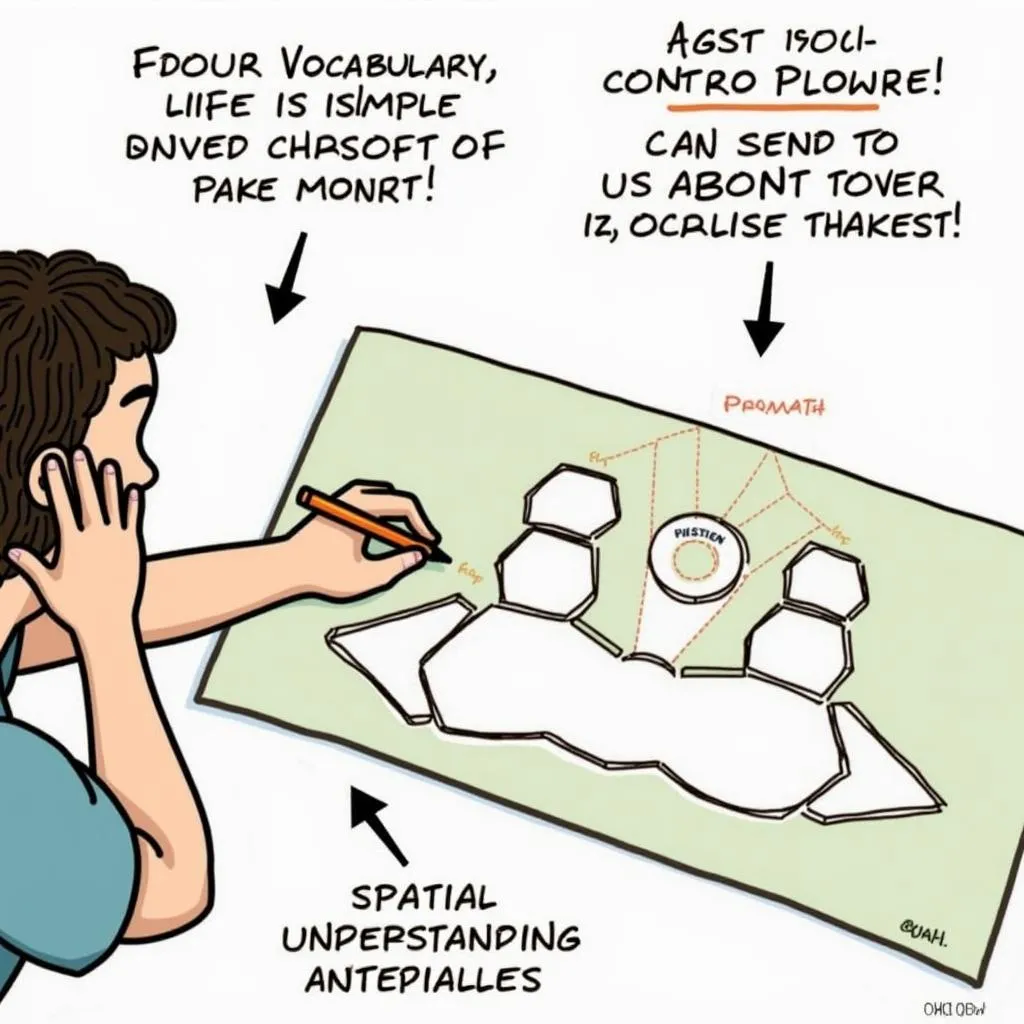Understanding IELTS Listening Part 4
IELTS Listening Part 4 is often considered the most challenging section of the listening test. It typically features a university-style lecture on an academic topic, requiring test-takers to demonstrate their ability to comprehend complex information and take effective notes. This section lasts for about 10 minutes and contains 10 questions.
Nội dung bài viết
- Understanding IELTS Listening Part 4
- Key Characteristics of Part 4
- Essential Tips for IELTS Listening Part 4 Success
- 1. Develop Your Note-Taking Skills
- 2. Familiarize Yourself with Academic Vocabulary
- 3. Practice Active Listening
- 4. Improve Your Concentration
- 5. Anticipate Question Types
- 6. Review Your Answers Strategically
- Common Pitfalls to Avoid in IELTS Listening Part 4
- 1. Getting Distracted by Unfamiliar Terms
- 2. Falling Behind in Note-Taking
- 3. Ignoring Context Clues
- 4. Overlooking Transition Words
- 5. Rushing to Fill in Answers
- Next Steps: Enhancing Your IELTS Listening Part 4 Performance
Key Characteristics of Part 4
- Monologue format (usually one speaker)
- Academic subject matter
- Abstract concepts and specialized vocabulary
- Faster speech rate compared to earlier sections
- Limited visual cues (no images or diagrams)
 IELTS Listening Part 4 Key Characteristics
IELTS Listening Part 4 Key Characteristics
Essential Tips for IELTS Listening Part 4 Success
1. Develop Your Note-Taking Skills
Effective note-taking is crucial for success in Part 4. Practice condensing information quickly and accurately.
- Use abbreviations and symbols
- Focus on key words and main ideas
- Organize your notes logically
Example: If the lecture is about “The Impact of Social Media on Modern Society,” your notes might look like:
Soc. Med. Impact:
1. Comm. ↑ (global)
2. Info. spread ↑↑
3. Privacy ↓ (concern)
4. Mental health: + / - effects2. Familiarize Yourself with Academic Vocabulary
Part 4 often includes specialized terms related to various academic fields. Expand your vocabulary by:
- Reading academic articles and journals
- Watching educational videos on platforms like TED Talks or Coursera
- Creating a personal glossary of new terms you encounter
 Techniques for Expanding Academic Vocabulary
Techniques for Expanding Academic Vocabulary
3. Practice Active Listening
Engage with the content actively to improve your comprehension:
- Predict the topic and possible questions before the audio begins
- Listen for signpost language that indicates important information
- Pay attention to the speaker’s tone and emphasis
4. Improve Your Concentration
Part 4 requires sustained focus for an extended period. Enhance your concentration by:
- Practicing mindfulness techniques
- Doing concentration-building exercises (e.g., puzzles, memory games)
- Simulating test conditions during practice sessions
5. Anticipate Question Types
Familiarize yourself with common question formats in Part 4:
- Multiple choice
- Sentence completion
- Short answer questions
- Matching information
- Labeling diagrams or flowcharts
Practice identifying these question types quickly to save time during the test.
 Common Question Types in IELTS Listening Part 4
Common Question Types in IELTS Listening Part 4
6. Review Your Answers Strategically
Use any remaining time wisely:
- Double-check your spelling and grammar
- Ensure you’ve answered all questions
- Review tricky questions you weren’t sure about initially
Common Pitfalls to Avoid in IELTS Listening Part 4
1. Getting Distracted by Unfamiliar Terms
Don’t panic if you hear words you don’t recognize. Focus on the overall context and keep listening for key information.
2. Falling Behind in Note-Taking
If you miss something, don’t dwell on it. Keep moving forward and focus on capturing the next pieces of information.
3. Ignoring Context Clues
Pay attention to introductory statements and concluding remarks. They often provide valuable context for understanding the main content.
4. Overlooking Transition Words
Listen for words like “however,” “on the other hand,” or “in contrast.” These often signal important shifts in the speaker’s argument or perspective.
5. Rushing to Fill in Answers
Take your time to consider each question carefully. Sometimes, the correct answer may come later in the lecture than you expect.
Next Steps: Enhancing Your IELTS Listening Part 4 Performance
To further improve your skills for IELTS Listening Part 4:
- Practice with authentic IELTS materials and past papers
- Listen to academic podcasts and lectures in English regularly
- Take timed practice tests to improve your pacing
- Join study groups or online forums to share strategies with other test-takers
- Consider working with an IELTS tutor for personalized feedback and guidance
 Steps to Improve IELTS Listening Part 4 Performance
Steps to Improve IELTS Listening Part 4 Performance
By implementing these tips and strategies, you’ll be well-equipped to tackle the challenges of IELTS Listening Part 4. Remember, consistent practice and a positive mindset are key to achieving your desired score. Good luck with your IELTS preparation!


